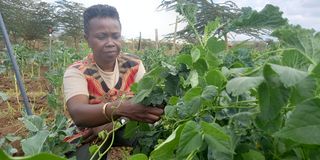Premium
How to ensure the success of EA’s agroecology

Sylvia Kuria at her farm in Lare in Maai Mahiu on the outskirts of Naivasha town. She is a successful agroecology farmer.
The second East Africa Agroecology Conference, convening in Nairobi this week from March 25-28, is not a mere regional gathering; it is a pivotal moment for the future of agriculture across the continent.
This assembly of policymakers, farmers, academics and civil society underscores the burgeoning, and increasingly critical, recognition of agroecology’s transformative potential.
Within the conference’s diverse tracks, the subtheme “Empowerment of women and youth movements in agroecology” stands out as fundamentally indispensable. It acknowledges the crucial role of both women and youth in advancing agroecological practices.
This emphasis is not a matter of political expediency; it is a pragmatic response to East Africa’s demographic realities and the undeniable roles women and youth play in the intricate agricultural value chain. Moreover, escalating climate shocks, with their unpredictable and devastating impacts, disproportionately afflict these vulnerable groups.
Through the Rural Women Cultivating Change Program, I have witnessed first-hand the extraordinary resilience and enduring struggles of women farmers in Baringo, Kitui, Nakuru and Laikipia counties. The programme focuses on investments that improve women’s access to and control over productive resources—land, capital, inputs, and infrastructure—and promotes agro-ecological approaches to achieve food security and improve livelihoods.
Women and youth experience persistent disparities in the agricultural sector, including limited land ownership and restricted access to vital resources like quality inputs, technology and machinery. Despite these obstacles, they have demonstrated remarkable ingenuity, pioneering sustainable agroecological strategies such as climate-resilient seed preservation, innovative water conservation and cooperative-driven market access.
The conference must serve as a platform to elevate these invaluable innovations, ensuring their recognition, scaling and integration into broader agroecological policies.
Agroecology is rooted in the ecofeminist ethic of care—a profound respect and responsibility for the land, community and future generations. Women, often custodians of biodiversity and repositories of ancestral agroecological knowledge, possess intimate relationships with the land. Youth infuse innovation and climate awareness. When these forces converge, they challenge the extractive and patriarchal agricultural models, fostering a future rooted in justice, reciprocity and regeneration.
Governments across East Africa bear a critical responsibility in facilitating the meaningful involvement of women and youth in agroecology. They must develop and implement comprehensive national agroecology strategies that address the unique needs of these groups, including policies promoting equitable access to land, credit and markets. It must also connect farmers to markets for their agroecological products.
The future of East African agriculture hinges on empowering women and youth. This conference must serve as a catalyst for that transformation.
Mr Mugochi is the Regional Director at Hivos East Africa.


